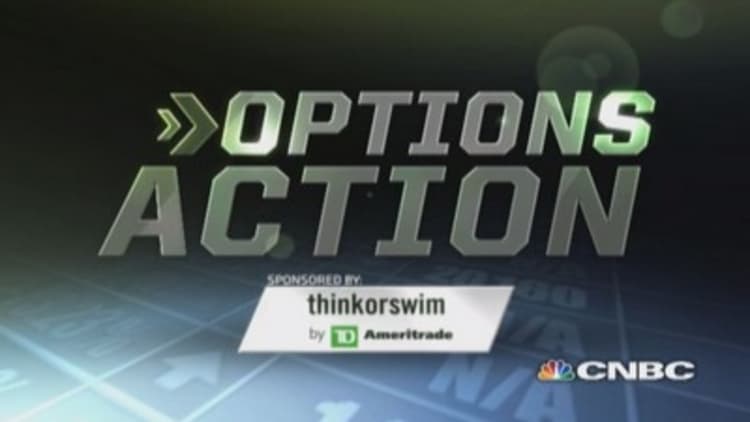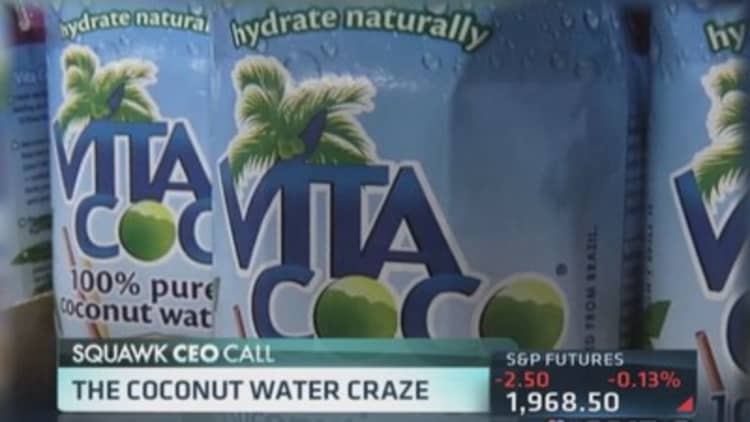Yet another craft brew is on the rise—but this isn't a specific beverage. It's an entire industry.
"It's like when you walk into any corner bar anymore and there's at least one craft beer on tap. We're hoping that if people can find room within their contracts with big soda companies, they can put one of our craft sodas on tap right next to those big soda companies," said Mike Parker, marketing manager for Appalachian Brewing Company, a brewer, and now a craft soda company, based in Harrisburg, Pennsylvania.
Craft sodas, largely defined as being manufactured in smaller batches with more natural ingredients, is still just a fraction of the overall soda market, said John Sicher, editor of Beverage Digest. He estimates that craft soda "at best" owns a 1 percent share of the roughly 9 billion-case U.S. soda market. Still, the number remains difficult to pin down due to the difficulty of defining craft soda. This is partially due to the "real sugar" versions of products offered by Coke and Pepsi and premium colas offered by big brands, Sicher said.
Regardless of the definition, though, craft soda companies' products are slowly creeping away from being a specialty item to finding a greater demand from a mainstream audience.
Read More Sodastream trader makes 3,000% profit in two hours
Jones Soda and Reed's, craft soda's two giants, have had skin in the major grocer game since the 1990s. Now even smaller companies such as Appalachian are bringing local, artisanal sodas to the masses, striking broader distribution deals with companies such as Wal-Mart.
"We're always looking to offer the right assortments for individual communities. Appalachian Brewing Company is an example of those efforts," said Danit Marquardt, a Wal-Mart spokeswoman. "Our customers in Pennsylvania wanted this soft drink, so we offer them to our customers in six stores."
Marquardt also cited birch soda, which Wal-Mart offers in 36 stores along the East Coast, as another example of the company's push towards this mission.
Appalachian, which operates seven brewpubs, has wowed local palettes as well as the tastes of out-of-staters with its bottled lineup of root beers, birch beer and ginger beer. The company brews in small batches, Parker said, and uses as many quality, natural ingredients as possible. The only ingredient that isn't natural, Parker added, is sodium benzoate, a preservative that prevents the soda from fermenting in the bottle.
"We've noticed that we've taken on some larger amounts of orders and we've been setting ourselves up to continue to do that. We've seen enormous growth in the last 24 months," said Parker.
The growth comes from a mix of factors. Appalachian is distributed within Pennsylvania via its brewpubs and assorted grocery and convenience stores through the state. It also has extended outside of Pennsylvania through Wegman's stores and through Giant Food Stores, a chain that has locations in Pennsylvania, Maryland, Virginia and West Virginia.
Read More Peruvian upstart AJE takes on Coke and Pepsi in Asia
"Their sales are very robust, and we consider them a very good vendor of ours," said Chris Brand, a spokesman for Giant. "Working with Appalachian Brewing Company ties back to our message to customers that we support local producers, local businesses and the local economy."
Brand said that customers are wanting more and more to know where products come from, and that their purchases support local farmers and producers, and that this has been a key factor in Appalachian's success in its stores, alongside the craft soda boom.
"Craft soda has really taken off," Brand said. "Sales are up and strong; the trend is good." He declined to disclose specific sales numbers.

For Chris Reed, the CEO and founder of Reed's, based in Los Angeles, craft soda isn't so much of a trend. Reed founded the company 25 years ago as a "hippie yoga guy that studied meditation, Chinese medicine and Indian herbology" who wanted to change the world with ginger and the spice's "good mojo."
Reed founded his company in 1989 using natural ginger beer recipes from the 18th and 19th centuries and found himself well-positioned when the natural food craze began kicking in.
"Because we rode the natural food industry, we were able to get very big without a huge capital expenditure," Reed said. "I've been an early part of this revolution for healthy eating, and soda may be the wrong department for it, but when you're dosing yourself with ginger that's a good thing."
Reed's stock took a hit recently when a large fund pulled out of the company, but it still remains at the forefront of its industry. Reed's, distributed nationwide in stores, has seen its sales double since 2009, and experienced a 10 percent revenue increase, to nearly $9 million, and a 15 percent gross profit increase, to nearly $3 million, from the first quarter of 2013 to the first quarter of 2014, according to its latest earnings report. The company anticipates revenue growth of 15 to 25 percent in 2014.
"I've done my first national TV commercial, and that started on Monday," Reed said. "We're going to continue to push our product, but now we're making a lot more noise. We're also expanding our sales force and expanding our sales a lot more from grocery stores into little stores, restaurants, bars and convenience—the other half of the market for food."
Read More PepsiCo quarterly profit falls 2 percent
But will entering the mainstream dilute craft soda's booming stream? Both stores and the makers say no.
"It's always great news to hear that local vendors we've partnered with over the years are getting picked up nationally," said Brand. "When you have a product that has its origin in local grocery stores then gets adopted by a larger retail, that will lift sales in general."
Read More
Reed said that some companies are trying to bank on the market's trend using marketing schemes that don't match their products, but while that may be the case, his methods are staying true.
"There's a guy that makes it look cute and buys his flavors from flavor companies, but we're a throwback to sodas from the 1820s. It's a little bit difficult, and it's a pain, but it's what we do," Reed said.
"I do want to make it fun, because I am a fun guy, but I do have a serious background and rationale for what I do."

Some, however, remain skeptical if craft soda will continue to rise.
"If Queen Elizabeth were holding a reception at Buckhingham Palace, she might serve premium French Champagne and premium Russian vodka, but if she were serving soft drinks, she'd probably be happy with a Coke or Pepsi because they're viewed as first class by nearly all consumers," said Beverage Digest's Sicher.
"In most markets in the world, if the consumer wants a drink of cola, a Coke or Pepsi will more than suffice."
-- By Bo McMillan, special to CNBC.com

